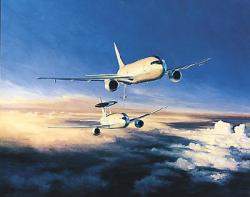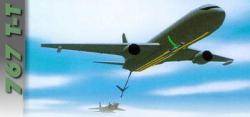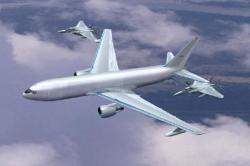The 767-200-Based Tanker Deal Still Looks Sweet for Boeing
 The General Accounting Office, after
having first been blocked from even looking at the 'done deal' the USAF and Boeing were
presenting for funding, finally had a better look at the proposed
Air Force/Boeing deal for KC-767A tankers, and issued a more-comprehensive report last
month. Senator John Warner (R-VA), the Chairman; and Senator Carl
Levin (D-MI), the Ranking Member of the Senate Committee on Armed
Services, though, had some questions as to how both the Air Force's
and GAO's figures were arrived at. The GAO has now addresed the
senators' questions, and has, in its dry and professional way,
opened up more questions, especially concerning
how the Air Force tortured its numbers to make the proposed lease
deal look less-expensive, relative to a purchase deal. [Even after
all the bending and twisting was finished, the lease deal -- the
Air Force's preferred plan -- came out 'way more-expensive than a
purchase deal, in the September report. That seemingly hasn't
changed --ed.]
The General Accounting Office, after
having first been blocked from even looking at the 'done deal' the USAF and Boeing were
presenting for funding, finally had a better look at the proposed
Air Force/Boeing deal for KC-767A tankers, and issued a more-comprehensive report last
month. Senator John Warner (R-VA), the Chairman; and Senator Carl
Levin (D-MI), the Ranking Member of the Senate Committee on Armed
Services, though, had some questions as to how both the Air Force's
and GAO's figures were arrived at. The GAO has now addresed the
senators' questions, and has, in its dry and professional way,
opened up more questions, especially concerning
how the Air Force tortured its numbers to make the proposed lease
deal look less-expensive, relative to a purchase deal. [Even after
all the bending and twisting was finished, the lease deal -- the
Air Force's preferred plan -- came out 'way more-expensive than a
purchase deal, in the September report. That seemingly hasn't
changed --ed.]
Below are excerpts of the GAO's letter to the senators, along
with our explanatory headers:
Let's average this together, and have the numbers come out at
the top...
"...provided by the Air Force in October 2003 showed that they
used six different methods to estimate the cost of the basic
B767-200ER aircraft. The prices developed under the approaches
ranged from $60.0 million to $80.5 million per aircraft for an
average of $71.1 million. Air Force officials ultimately used a
weighted average and concluded that a reasonable price for the
basic aircraft would be about $79.0 million per aircraft."
Quantity purchases lead to... higher prices?
 "However, the Air Force did not
provide sufficient evidence to explain how negotiating for 100
aircraft would necessarily lead to a higher price than the average
unit price for 100 aircraft given that IDA did not assume that a
volume discount would be given."
"However, the Air Force did not
provide sufficient evidence to explain how negotiating for 100
aircraft would necessarily lead to a higher price than the average
unit price for 100 aircraft given that IDA did not assume that a
volume discount would be given."
...a price cap above all likely pricing, um, isn't very
functional:
"While the draft contract does include a “best price
guarantee,” this provision only guarantees that The Boeing
Company will not sell comparable KC-767A aircraft for less than the
Air Force would pay but it does not address the question of whether
the Air Force could have obtained a lower price. Moreover, as we
testified before the Senate Committees on Armed Services, and
Commerce, Science and Transportation,11 it is not clear to us why
the sales cap is 15 percent as negotiated, when a financial
analysis has concluded that Boeing’s profit on commercial 767
aircraft is in the range of 6 percent."
It's a 'belief' thing. So have faith.
 "In oral comments on a draft of this
correspondence, representatives from the Air Force did not disagree
with our analysis or our conclusions. However, these officials
believe that they negotiated a reasonable price for the aircraft as
planned to be configured by the Air Force and in the quantity to be
delivered..."
"In oral comments on a draft of this
correspondence, representatives from the Air Force did not disagree
with our analysis or our conclusions. However, these officials
believe that they negotiated a reasonable price for the aircraft as
planned to be configured by the Air Force and in the quantity to be
delivered..."
[If you're really looking for other options, Senators Warner and
Levin asked the GAO to look at another idea: lease the first 25
tankers, and buy the other 75. The GAO had a
look along those lines, too --ed.]
 Aero-News: Quote of the Day (12.07.25)
Aero-News: Quote of the Day (12.07.25) ANN's Daily Aero-Linx (12.07.25)
ANN's Daily Aero-Linx (12.07.25) NTSB Final Report: Lafferty Jack Sea Rey
NTSB Final Report: Lafferty Jack Sea Rey Classic Aero-TV: The B29 SuperFortress Doc - History in Flight
Classic Aero-TV: The B29 SuperFortress Doc - History in Flight Airborne 12.08.25: Samaritans Purse Hijack, FAA Med Relief, China Rocket Fail
Airborne 12.08.25: Samaritans Purse Hijack, FAA Med Relief, China Rocket Fail





